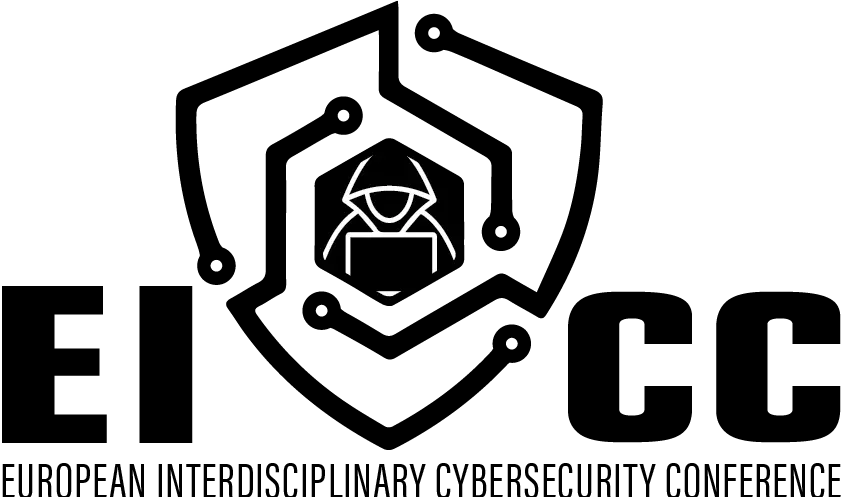
European Interdisciplinary Cybersecurity Conference
Darmstadt University of Applied Sciences [h_da]
Darmstadt, Germany
News
-
19 January 2026
Submission deadline has been extended to 28 January 2026 [AoE].
About the conference

EICC 2026 aims at establishing a premium venue for the exchange of information and sharing of research findings on cybersecurity and its many aspects between academics and practitioners in Europe. EICC 2026 encourages the dialogue between computer scientists and researchers in all other fields related to cybersecurity, such as behavioral sciences, sociology, criminology, investigations and law. Interdisciplinary contributions are especially welcome.
EICC 2026 is the 10th edition of the conference, which until 2019 was known as the Central European Cybersecurity Conference – CECC, being rebranded to underscore the interdisciplinarity of the conference and broaden its reach.
EICC 2026 is planned as a face-to-face conference.
EICC 2026 proceedings will be published in Springer Communications in Computer and Information Science (CCIS), indexed by dblp and Scopus.
Important dates
Submission deadline (extended)
Author notification
Camera-ready
Call for papers
Scope
The conference is devoted to exploring and presenting original innovative applications, scientific and technological advancements in the field of cybersecurity. Topics for this conference include, but are not limited to:
- Accessible and inclusive cybersecurity
- Artificial Intelligence (AI) applied to cybersecurity
- Artificial Intelligence (AI) trustworthiness
- Big data and privacy
- Business continuity and incident response
- Child cybersecurity and privacy
- Cloud security
- Critical infrastructure security
- Cyber forensics
- Cyber insurance
- Cyber leadership
- Cyber warfare
- Cyber-physical systems security
- Cybersecurity and cyber resilience
- Cybersecurity culture
- Cybersecurity responsibilisation
- Cybersecurity incident reporting
- Digital currency, blockchains and cybercrime
- Digital privacy
- Embedded systems security
- Healthcare information security and privacy
- Human cybersecurity decision making
- Information security governance
- Internet of Things (IoT) privacy and security
- Law, investigation, internet jurisdiction and ethics
- Mobile security
- Network security
- Security management
- Software development security
- Surveillance, interception, blocking and sovereignty
- Trust management
- Whistleblowing
Publication
EICC 2026 proceedings will be published by Springer Nature in the Communications in Computer and Information Science (CCIS) series.
Proceedings from the previous conferences are available here:
Submission guidelines
The official language of the conference is English. Papers (references included) are limited to 16 pages and up to 4 additional pages with mandatory surcharges.
All papers must be original and not simultaneously submitted to another journal or conference. Authors are expected to adhere to the best practices in terms of scientific integrity as mentioned in the Publishing Ethics section of the guidelines. The following paper categories reporting on original research findings are welcome:
Full papers
(12-16+ pages)
Short papers
(6-11 pages)
Papers submitted to EICC 2026 have to use the Springer Lecture Notes in Computer Science Proceedings Template. Please, read template instructions carefully before submitting the paper. The use of the LaTeX template is strongly encouraged. Non-proficient LaTeX users are encouraged to use the Overleaf online collaborative Latex platform (LaTeX2e Proceedings Templates on Overleaf).
The quality of the research papers will be assessed based on its originality, significance and clarity. All submitted research papers will undergo a double-blind reviewing process. Please, make sure that submitted papers do not contain author names or obvious self-references (e.g., self-citations, project funding statemetns, institutional review board names). Please note that the page limit applies to camera-ready papers with author names included and not the submitted anonymized version. Each paper will be reviewed by at least three reviewers. Afterwards, a discussion will be held by the chairs and reviewers to determine the outcomes of the peer-review.
Submission of a paper implies that at least one of the authors will register and present the paper at the conference if the paper is accepted.
Submission of papers should be performed using the EasyChair EICC 2026 submission system.
Full papers can exceed the page limit by a maximum of 4 pages. Each additional page above the page limit will be charged on top of the registration fee.
Committees
Conference chair
Andreas Heinemann
Darmstadt University of Applied Sciences (Germany)
eicc2026@easychair.org
Program committee co-chairs
Karen Renaud
Strathclyde University (UK)
eicc2026@easychair.org
Steffen Wendzel
Ulm University (Germany)
eicc2026@easychair.org
Program committee
Habtamu Abie
Norwegian Computing Centre (Norway)
Marios Anagnostopoulos
Democritus University of Thrace (Greece)
Niyati Baliyan
National Institute of Technology Kurukshetra (India)
João Paulo Barraca
University of Aveiro (Portugal)
Simona Bernardi
Universidad de Zaragoza (Spain)
Luca Caviglione
CNR - IMATI (Italy)
Michał Choraś
Bydgoszcz University of Science and Technology (Poland)
Kovila Coopamootoo
King’s College London (UK)
Luca Davoli
University of Parma (Italy)
Changyu Dong
Newcastle University (UK)
Pavlos Efraimidis
Democritus University of Thrace (Greece)
Tobias Eggendorfer
TH Ingolstadt (Germany)
Sergio Esposito
Università degli Studi di Catania (Italy)
Virginia Franqueira
University of Kent (UK)
Damjan Fujs
University of Ljubljana (Slovenia)
Steven Furnell
University of Nottingham (UK)
Dieter Gollmann
Hamburg University of Technology (Germany)
Petra Grd
University of Zagreb (Croatia)
Nils Gruschka
University of Oslo (Norway)
Piroska Haller
Petru Maior University (Romania)
Marko Hölbl
University of Maribor (Slovenia)
Pedro Inácio
Universidade da Beira Interior (Portugal)
Martin Gilje Jaatun
University of Stavanger & SINTEF Digital (Norway)
Georgios Karopoulos
European Commission, Joint Research Centre (Italy)
Stefan Katzenbeisser
University of Passau (Germany)
Wenjuan Li
Education University of Hong Kong (China)
Shigang Liu
CSIRO's Data61 (Australia)
Brad Malin
Vanderbilt University (US)
David Megías
Internet Interdisciplinary Institute (IN3) & Universitat Oberta de Catalunya (Spain)
Weizhi Meng
Lancaster University (UK)
Pal-Stefan Murvay
Politehnica University of Timisoara (Romania)
Sebastian Pape
Social Engineering Academy GmbH (Germany)
Sergio Pastrana
Universidad Carlos III de Madrid (Spain)
Isabel Praça
GECAD / ISEP (Portugal)
Tobias Schmidbauer
Nuremberg Institute of Technology (Germany)
Bernardo Sequeiros
Universidade da Beira Interior (Portugal)
Anastasia Sergeeva
University of Luxembourg (Luxembourg)
Juraj Sikra
Karlsruhe Institute of Technology (Germany)
Gerardo Simari
Universidad Nacional del Sur & CONICET (Argentina)
Kai Simon
Fraunhofer-Gesellschaft (Germany)
Michael Sirivianos
Cyprus University of Technology (Cyprus)
Florian Skopik
Austrian Institute of Technology (Austria)
Hung-Min Sun
National Tsing Hua University (Taiwan)
Sotirios Terzis
University of Strathclyde (UK)
Igor Tomičić
University of Zagreb (Croatia)
Fernando Tricas
Universidad de Zaragoza (Spain)
Nicolas Tsapatsoulis
Cyprus University of Technology (Cyprus)
Christos Xenakis
University of Piraeus (Greece)
Nicola Zannone
Eindhoven University of Technology (Netherlands)
Sebastian Zillien
Ulm University (Germany)
Local organizing co-chairs
Andreas Heinemann
Darmstadt University of Applied Sciences (Germany)
eicc2026@easychair.org
Sara Hahn
Darmstadt University of Applied Sciences (Germany)
eicc-2026-local-chairs.fbi@news.h-da.de
Treasury
Simone Zimmermann
CAST e.V. (Germany)
eicc-2026-treasurer.fbi@news.h-da.de
Local organizing team
UCS Research Group
Darmstadt University of Applied Sciences (Germany)
Steering committee
Igor Bernik
University of Maribor (Slovenia)
Bela Genge
University of Medicine, Pharmacy, Sciences and Technology of Tg. Mures (Romania)
Jörg Keller
FernUniversität in Hagen (Germany)
Blaž Markelj
University of Maribor (Slovenia)
Aleksandra Mileva
University Goce Delcev (North Macedonia)
Wojciech Mazurczyk
Warsaw University of Technology (Poland)
Simon Vrhovec
University of Maribor (Slovenia)